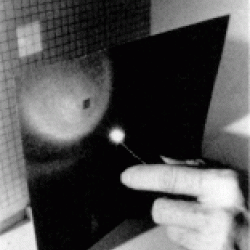Source Institutions
Source Institutions
Add to list Go to activity
Activity link broken? See if it's at the internet archive

In this math activity related to light, learners explore why a light, such as a candle or a streetlight, looks dimmer the farther away from it we get. The answer lies in the Inverse Square Law, which learners demonstrate using graph paper or perfboard. (Two methods are given for this activity.) Learners will discover that the intensity of light is described by the power distributed over an area.
- 10 to 30 minutes
- 10 to 30 minutes
- $5 - $10 per student
- Ages 11 - 18
- Activity
- English
Quick Guide
Materials List (per student)
- A Mini-Maglite™ flashlight. No substitutes! A point source of light is required for this Snack. (Or make your own economical light source with a square of heavy cardboard, a Mini-Maglite™ replacement bulb, two batteries - either AAA, AA, C, or D - and clip leads to connect them. See Assembly for details.)
- Graph Paper [Graph Paper Version]
- Cardboard or foamcore [Graph Paper Version]
- Perfboard [Perfboard Version]
- Cardboard to use as a screen [Perfboard Version]
- A file card
- A pencil
- A knife or scissors
- Ruler
- Adult help
Subjects
-
Life Sciences
-
Human Body
- The Brain and Nervous System
-
Human Senses and Perception
- Vision
- Perception
-
Human Body
-
Mathematics
- Algebra
-
Data Analysis and Probability
- Data Analysis
- Data Collection
- Measurement
-
Number and Operations
- Exponents
-
The Nature of Technology
-
The Design Process
- Problem Solving
-
The Design Process
-
Physical Sciences
-
Vibration and Waves
- Light and Optics
-
Vibration and Waves
-
The Nature of Science
-
The Scientific Process
- Conducting Investigations
- Gathering Data
-
The Scientific Process
Audience
To use this activity, learners need to:
- see
- touch
Learning styles supported:
- Involves hands-on or lab activities
Other
This resource is part of:
Access Rights:
- Free access
By:
Rights:
- All rights reserved, The Exploratorium,
Funding Sources:
- National Science Foundation
- California Department of Education
- NEC Foundation of America
